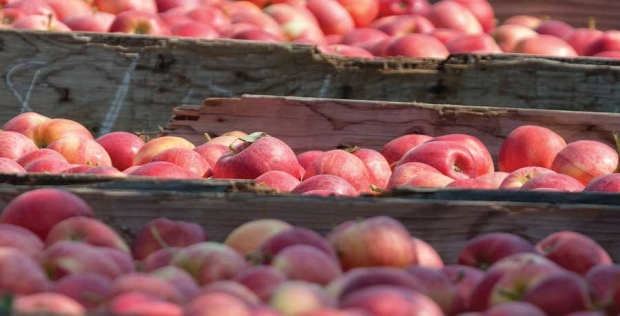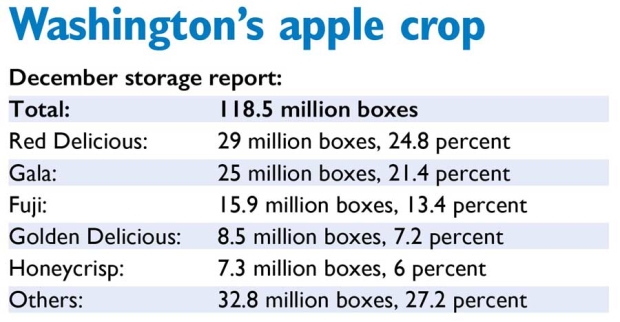
Gala apples from the 2015 season are harvested north of Wapato, Washington on August 13, 2015. Washington’s apple crop was the third largest, coming in over 118 million boxes designated for fresh market. (TJ Mullinax/Good Fruit Grower)
Apple prices were going up just as Washington’s packing houses announced their December storage report.
Growers harvested 118.5 million boxes of apples for the fresh market this season, the third-largest crop ever, said Jon DeVaney, president of the Washington State Tree Fruit Association.
That’s about 15 percent smaller than last year’s monstrous 140 million boxes of apples.
“Growers need to know that it’s a very manageable crop,” said DeVaney.
The good news for growers this season is that it’s improving with time.
“If you talk to most growers, they feel that this year is shaping up so much better than last year,” DeVaney said.
As of Dec. 1, packing houses had shipped about 25 percent of the crop, a higher than average share by that point of the season.
“We’re off to a strong start,” DeVaney said.

Source: U.S. Department of Agriculture, Agricultural Marketing Service
Also, early December prices are higher than last year, which should make for higher returns from packing houses.
Meanwhile, prices are climbing this year as opposed to falling, as they did in early December 2014, right when the Puget Sound port slowdowns began.
The season didn’t start out so well.
The early 2015 harvest had caused some extra overlap with 2014 storage, especially Red Delicious apples, putting downward pressure on prices in September and October.
Holdovers always overlap with the new crop some, but this year “is unusual only because the 2014 crop was unusually large,” DeVaney said.
“We carried over some fruit into August and September, which we normally don’t do,” said Chris McCarthy, a spokesman for Auvil Fruit Company in Orondo. “Usually we’re done by April or May.”
The 2014 crop cleared warehouses at about the same pace as the 2012 crop, the previous record. The industry shipped 6.7 percent of the 2014 crop after Sept. 1 in 2015, compared to 8 percent of the 2012 crop after Sept. 1, 2013.
Growers are expressing some concern about storage quality due to water shortages and extra hot weather over the summer.
“Weather had an impact on us just like it did everybody else,” McCarthy said.
Charlie de La Chappelle, an Outlook orchardist, estimated he culled about 20 percent of his Galas, higher than usual, and noticed checking (cracks in the skin) on 25 to 35 percent of his Fujis.
Guessing is hard because some of the problems aren’t showing up until the apples are packed, said de la Chappelle, who farms in the Roza Irrigation District, a junior-rights district that shut off deliveries for three weeks in May.
“It’s like opening a Christmas present — you don’t know until you run them over the line,” he said. •
– by Ross Courtney






Leave A Comment